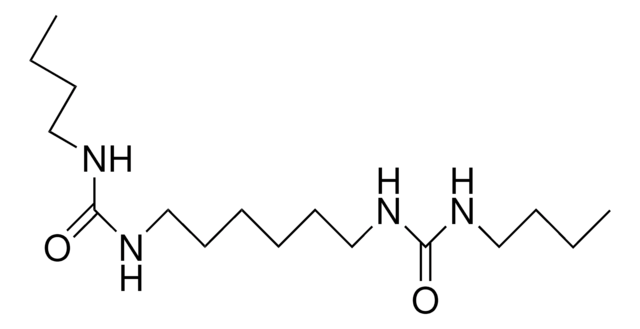All Photos(1)
About This Item
Linear Formula:
CH3(CH2)3NHCONH2
CAS Number:
Molecular Weight:
116.16
Beilstein:
1744775
EC Number:
MDL number:
UNSPSC Code:
12352100
PubChem Substance ID:
NACRES:
NA.22
Recommended Products
Quality Level
Assay
99%
form
crystals
mp
95-98 °C (lit.)
SMILES string
CCCCNC(N)=O
InChI
1S/C5H12N2O/c1-2-3-4-7-5(6)8/h2-4H2,1H3,(H3,6,7,8)
InChI key
CNWSQCLBDWYLAN-UHFFFAOYSA-N
Looking for similar products? Visit Product Comparison Guide
Related Categories
Signal Word
Warning
Hazard Statements
Hazard Classifications
Acute Tox. 4 Oral
Storage Class Code
11 - Combustible Solids
WGK
WGK 3
Flash Point(F)
Not applicable
Flash Point(C)
Not applicable
Personal Protective Equipment
dust mask type N95 (US), Eyeshields, Gloves
Choose from one of the most recent versions:
Already Own This Product?
Find documentation for the products that you have recently purchased in the Document Library.
Joanna Krakowiak et al.
Journal of biological physics, 45(2), 161-172 (2019-03-25)
The results of thermal studies of denaturation of hen egg white lysozyme (HEWL) in water and an aqueous solution of N-butylurea (BU) are presented. High-precision densimetric measurements were used to characterize and analyze the changes of the specific volume, v
Kevin X Chen et al.
Bioorganic & medicinal chemistry, 16(4), 1874-1883 (2007-11-23)
Starting from a pentapeptide Hepatitis C virus NS3 protease inhibitor, a number of alpha-ketoamide inhibitors based on novel dichlorocyclopropylproline P2 core were synthesized and investigated for their HCV NS3 serine protease activity. The key intermediate 3,4-dichlorocyclopropylproline was obtained through a
Peter L Larsen et al.
Journal of the American Chemical Society, 126(21), 6522-6523 (2004-05-27)
Metal complexes with terminal chalcogenido ligands are known for the early transition-metal complexes, yet for the heavier congeners (e.g., sulfido and selenido), there are no analogous examples for the late 3d metal ions. Reported herein is the isolation and characterization
Srinivasan R Nagarajan et al.
Bioorganic & medicinal chemistry, 11(22), 4769-4777 (2003-10-15)
The human immunodeficiency virus (HIV) has been shown to be the causative agent for AIDS. The HIV virus encodes for a unique aspartyl protease that is essential for the production of enzymes and proteins in the final stages of maturation.
K Fujii et al.
Cancer letters, 18(3), 321-328 (1983-04-01)
A subcutaneous injection of 1-butyl-1-nitrosourea (BNU) at the maximum tolerated dose (333 mg/kg body wt.) to newborn CDF1 mice induced adenocarcinoma and adenoma of the lung, adenoma of the liver, thymic or non-thymic lymphoma and neurinoma of the acusticus nerve;
Our team of scientists has experience in all areas of research including Life Science, Material Science, Chemical Synthesis, Chromatography, Analytical and many others.
Contact Technical Service








